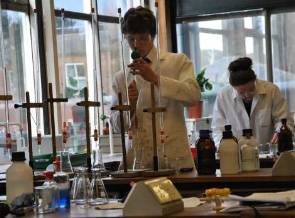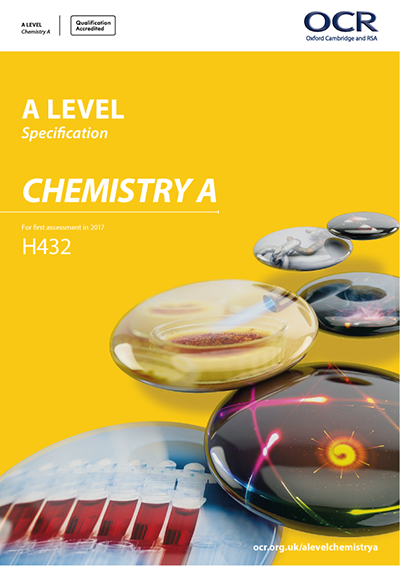Exam Board: OCR
Contact: Mrs C. Love / Dr A. Page
Course Overview
 Are you… wanting to be a doctor? Work in the chemical industry? Understand how chemistry can impact the environment? A problem solver? Keen on experimental work?
Are you… wanting to be a doctor? Work in the chemical industry? Understand how chemistry can impact the environment? A problem solver? Keen on experimental work?
If so, A Level chemistry will give you an exciting insight into the contemporary world of chemistry. It covers the key concepts of chemistry and practical skills are integrated throughout the course. This combination of academic challenge and practical focus makes the prospect of studying A Level chemistry highly appealing. You will learn about chemistry in a range of different contexts and the impact it has on industry and many aspects of everyday life. There are many opportunities to build practical skills through a range of experiments and investigations married with theoretical approaches which provides an interesting and challenging experience to link key chemical ideas and understand how they relate to each other. You will learn society makes decisions about scientific contributions to the success of the economy and society.

|
Course Title:
|
A Level Chemistry
|

View Specification
|
|
Exam Board:
|
OCR
|
|
Course Code:
|
H432
|
|
QAN:
|
601/5255/2 |
Entry Requirements:
General Entry Requirements* + GCSE Combined Science Trilogy – 2 x Grade 6 or GCSE Separate Sciences: Grade 6 in Chemistry, and grade 6 in either Physics or Biology plus GCSE English 5 (6 desirable) plus GCSE Maths 5
*General Entry Requirements = 5 GCSES 4-9 or A*-C to include Maths and English Lang or Lit Grade 5
Where can Chemistry take me?
An excellent base for a university degree in healthcare such as medicine, pharmacy and dentistry as well as the biological sciences, physics, mathematics, pharmacology and analytical chemistry. Chemistry is also taken by many law applicants as it shows you can cope with difficult concepts. Chemistry can also complement a number of arts subjects. A range of career opportunities including chemical, manufacturing and pharmaceutical industries and in areas such as forensics, environmental protection and healthcare. The problem solving skills are useful for many other areas such as forensics, environmental protection and food science.
Assessment
|
A Level |
ASSESSMENT |
% of Course |
Module 1 - Development of practical skills in Chemistry
Module 2 - Foundations in Chemistry
Module 3 - Periodic Table and energy
Module 4 - Core Organic Chemistry
Module 5 - Physical chemistry and the transition of elements
Module 6 - Organic chemistry and analysis |
Component 01 written paper; 100 marks;
2 hours and 15 minutes
Component 02 written paper; 100 marks;
2 hours and 15 minutes
Component 03 written paper; 75 marks;
1 hour and 30 minutes
Component 04 non exam assessment |
37%
37%
26% |
Contact: Mr T. Jordan
If you have any questions or queries relating to the Science curriculum please email headofscience@ecclesbourne.derbyshire.sch.uk for more information.